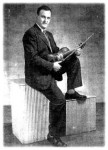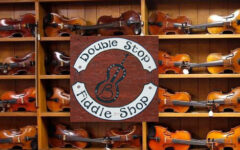 From October 1, 2010 through to the end of September 2011, we will, each day, celebrate the life of Bill Monroe by sharing information about him and those people who are associated with his life and music career. This information will include births and deaths; recording sessions; single, LP and CD release dates; and other interesting tidbits. Richard F. Thompson is responsible for the research and compilation of this information. We invite readers to share any tidbits, photos or memories you would like us to include.
From October 1, 2010 through to the end of September 2011, we will, each day, celebrate the life of Bill Monroe by sharing information about him and those people who are associated with his life and music career. This information will include births and deaths; recording sessions; single, LP and CD release dates; and other interesting tidbits. Richard F. Thompson is responsible for the research and compilation of this information. We invite readers to share any tidbits, photos or memories you would like us to include.
- October 21, 1915 William Owen Bradley born in Westmoreland, Tennessee. Bradley produced many of Bill Monroe’s Decca recordings. He is featured on piano, organ or vibes on five recording sessions from the early 1950s through to 1958. It was he who recorded covers of Jimmie Rodgers’ Caroline Sunshine Girl and Moon Mullican’s Mighty Pretty Waltz, for example, featuring Monroe with a standard country music band.
- October 21, 1916 Tommy Magness born Mineral Bluff, Georgia. Magness replaced Art Wooten in the summer of 1940 and played fiddle on the very first Blue Grass Boys recording session in the following October. Known at one time as Tennessee’s champion hoe-down fiddler, he was featured on the fiddle tune Katy Hill. *
- October 21, 1921 Jim Shumate born on Chestnut Mountain in northern Wilkes County, North Carolina. He was a fiddler for the Blue Grass Boys for about nine months ending in December 1945. His fiddle “kick-off” quickly become standard practice in bluegrass music. Shumate was also responsible for introducing Earl Scruggs to Bill Monroe. **
- October 21, 1976 Recording session – the second of two consecutive days in the studio. At this session, which featured the same personnel as on the previous day, the eight musicians recorded two instrumentals; Monroe’s Blues and Lucky Lady, and two trio numbers; The First Whippoorwill and My Louisiana Love. The first-named was issued as a single b/w My Sweet Blue-Eyed Darling (MCA 40675).
 ** As a teenager, Shumate went to work in a furniture factory, but he was soon playing on a local radio program in Hickory. One day, Bill Monroe was driving through North Carolina and happened to tune into the show. Shortly thereafter, Shumate received a surprise phone call from the father of bluegrass himself, who was in need of a fiddler. “He had heard me on this radio program”, remembers Shumate. “Asked me if I was the fellow that played such and such time, and I told him ‘yeah’. He said, ‘You’re the type of man I want if you want the job.’ So I said ‘Yeah! Be right there.’ ”
** As a teenager, Shumate went to work in a furniture factory, but he was soon playing on a local radio program in Hickory. One day, Bill Monroe was driving through North Carolina and happened to tune into the show. Shortly thereafter, Shumate received a surprise phone call from the father of bluegrass himself, who was in need of a fiddler. “He had heard me on this radio program”, remembers Shumate. “Asked me if I was the fellow that played such and such time, and I told him ‘yeah’. He said, ‘You’re the type of man I want if you want the job.’ So I said ‘Yeah! Be right there.’ ”
 * “He had that fine old-time touch, rich and pure, but he was able to put a touch of the blues to it.”
* “He had that fine old-time touch, rich and pure, but he was able to put a touch of the blues to it.”
Bill Monroe speaking of Tommy Magness







